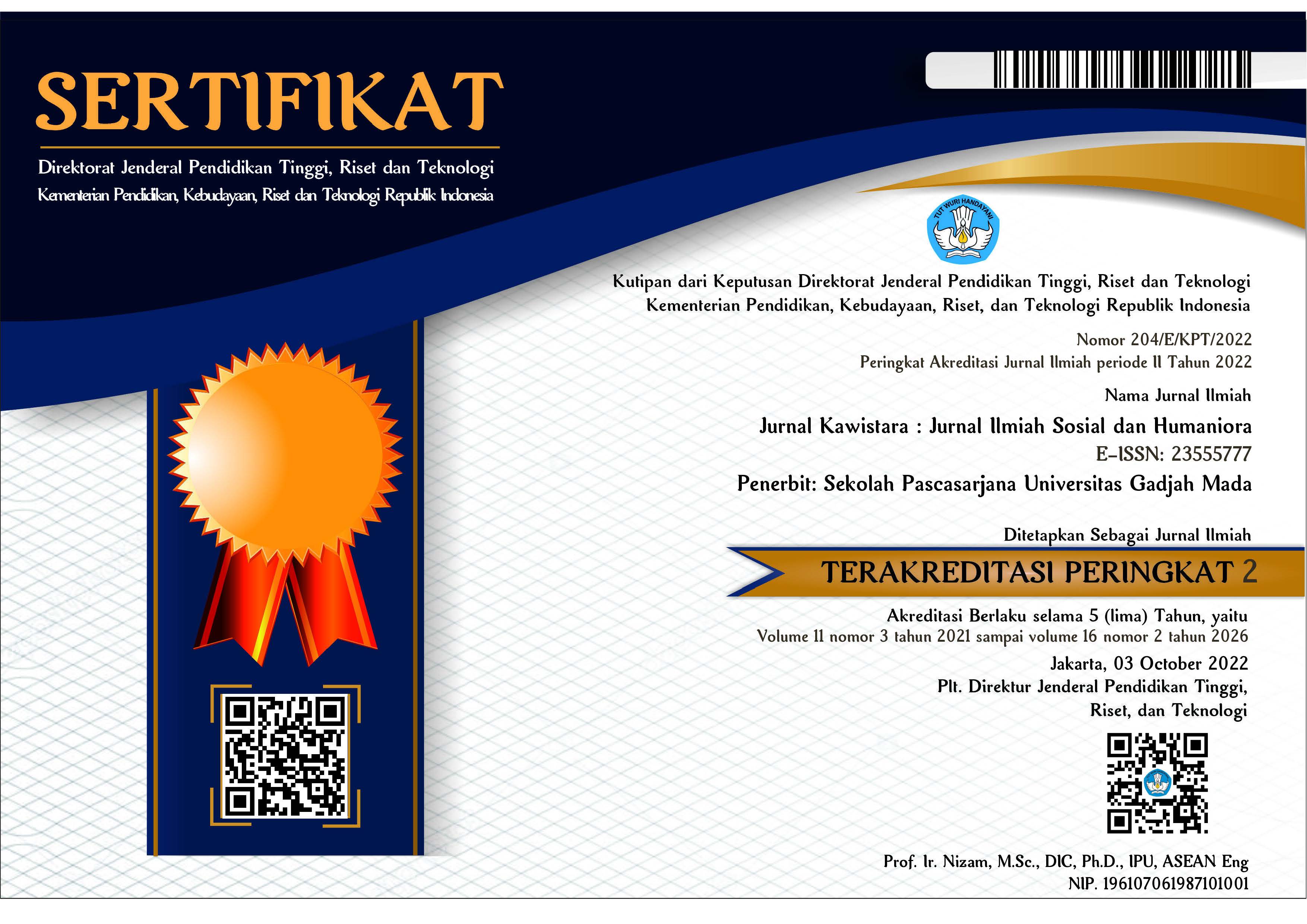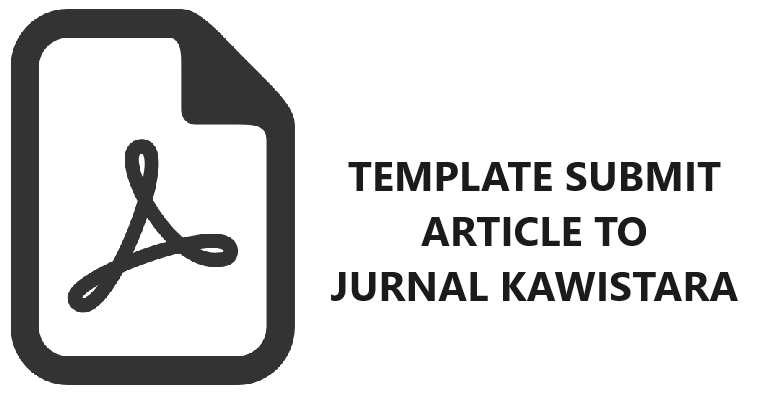- Focus and Scope
- Section Policies
- Peer Review Process
- Publication Frequency
- Open Access Policy
- Archiving
- Publication Ethics
- Screening for Plagiarism
- Digital Archiving
- Statistic Download Article
Focus and Scope
Jurnal Kawistara aims to explore elements of Indonesian culture and society by publication of research findings and scientific innovations that are practically relevance for the preservation of local culture, environmental sustainability, social cohesion and community welfare.
Jurnal Kawistara seeks to publish a balanced mix of high-quality theoretical or empirical research articles, case studies, review papers, comparative studies, and exploratory papers. In particular, Jurnal Kawistara looks for academic works that show the implication of social studies on practical issues concerning culture, environment, social cohesion and community welfare. Jurnal Kawistara also accepts papers from the discipline of natural science and technical studies that emphasize on social dimension of humanity issues. We invite critical and applied inquiries into wide range of sub-topics including but not limited to the following:
- Culture (a unique study of performing arts and classical culture, traditional from various regions in Indonesia, and modern cultural arts such as dance, fine arts, and music art also includes the study of Indonesian literature on classical and contemporary literary issues)
- Religion (Study of comparative religion, study of pluralism and religious diversity in Indonesia)
- Media (Cultural studies and media, New Media and Contemporary Societies)
- Gender (Urban Culture, Gender bias, and gender inequality)
- Public policy (extractive public policies, distributive public policies, and regulative public policies)
- Development (economic and social development, urban and regional development)
- Environment (customs, social and environmental, land and natural resource utilization)
- Disaster (local wisdom and social culture, disaster management, community empowerment, survival and humanity, disaster and social emergency response organizations)
- Tourism (ecotourism, tourism management, religious tourism, urban tourism, and cultural tourism)
- Other disciplines (engineering, natural science, arts) that emphasize on their implication on social and humanity issues.
All accepted manuscripts will be published both online and in printed forms. The journal publishes three thematic issues per year, namely April, August, and December.
Section Policies
Articles
Peer Review Process
PEER REVIEW PROCESS AND EDITORIAL DECISION
________________________________________
All articles submitted to Jurnal Kawistara: Journal of Social Science and Humanities must comply with the journal requirements (see author guidelines) for reviews. They are independently reviewed by two or more external reviewers in the form of double blind review. The reviewers may recommend for publication without revision, with major/minor revision, or rejection. Decision for publication and rejection is based on the reviewers’ reports and recommendations. Under certain circumstances, the editors may require another review before decision is made
*Please noted that Peer Review process takes 7-8 month for the minimum time. We encourage the authors to track the status by themselves and check your email regularly. All corresponding communication for this process will be notified by email. If the status of your article has not changed yet, please wait until the status is change.
REPRODUCTION POLICY
________________________________________
The objective of Jurnal Kawistara: The Journal of Social Sciences and Humanities, Graduate School UGM is to promote wider dissemination of systematic scholarly inquiries into the broad field of Social Science and Humanities with emphasis on interdisciplinary perspectives. Permission is hereby granted to reproduce any of the contents of the journal for use in courses of instruction, as long as the “copyright” of The Graduate School (GS), Universitas Gadjah Mada (UGM) is indicated in any reproductions.
Written application must be made to the Editor-in-Chief for permission to reproduce any of the contents of the journal for use in other than a course of instruction - e. g., inclusion in books or in any other publications intended for general distribution. In consideration for the grant of permission by the journal in such instances, the applicant must notify the author(s). Normally, the journal will not do a charge for the waiver of copyright, except when the copyright of articles in the journal has been transferred to the Graduate School of Universitas Gadjah Mada. The applicant must therefore ask permission for reproduction (for all purpose) from the author.
Publication Frequency
Jurnal Kawistara publishes 3 times per year: April, August, and December.
Open Access Policy
Jurnal Kawistara: The Journal of Social Sciences and Humanities provides immediate open access to its content. It carries the principle that making research free (downloadable) and available to the public supports a greater global exchange of knowledge.
Archiving
This journal utilizes the LOCKSS system to create a distributed archiving system among participating libraries and permits those libraries to create permanent archives of the journal for purposes of preservation and restoration. More...
Publication Ethics
If scientific misconduct or the presence of other substantial research irregularities is a possibility, the allegations are shared with the corresponding author, who, on behalf of all of the coauthors, is requested to provide a detailed response. After the response is received and evaluated, additional review and involvement of experts (such as statistical reviewers) may be obtained. For cases in which it is unlikely that misconduct has occurred, clarifications, additional analyses, or both, published as letters to the editor, and often including a correction notice and correction to the published article are sufficient.
Institutions are expected to conduct an appropriate and thorough investigation of allegations of scientific misconduct. Ultimately, authors, journals, and institutions have an important obligation to ensure the accuracy of the scientific record. By responding appropriately to concerns about scientific misconduct, and taking necessary actions based on evaluation of these concerns, such as corrections, retractions with replacement, and retractions, Jurnal Kawistara will continue to fulfill the responsibilities of ensuring the validity and integrity of the scientific record.
Complaints and Appeals
Jurnal Kawistara will have a clear procedure for handling complaints against the journal, Editorial Staff, Editorial Board or Publisher. The complaints will be clarified to a respected person with respect to the case of complaint. The scope of complaints includes anything related to the journal business process, i.e. editorial process, found citation manipulation, unfair editor/reviewer, peer-review manipulation, etc. The complaint cases will be processed according to COPE guideline. The complaint cases should be sent by email to: kawistara@ugm.ac.id
Peer review assists the editor in making editorial decisions and through the editorial communications with the author may also assist the author in improving the paper.
Any selected referee who feels unqualified to review the research reported in a manuscript or knows that its prompt review will be impossible should notify the editor and excuse himself from the review process.
Any manuscripts received for review must be treated as confidential documents. They must not be shown to or discussed with others except as authorized by the editor.
Reviews should be conducted objectively. Personal criticism of the author is inappropriate. Referees should express their views clearly with supporting arguments.
Reviewers should identify relevant published work that has not been cited by the authors. Any statement that an observation, derivation, or argument had been previously reported should be accompanied by the relevant citation. A reviewer should also call to the editor's attention any substantial similarity or overlap between the manuscript under consideration and any other published paper of which they have personal knowledge.
Reporting standards
Authors of reports of original research should present an accurate account of the work performed as well as an objective discussion of its significance. Underlying data should be represented accurately in the paper. A paper should contain sufficient detail and references to permit others to replicate the work. Fraudulent or knowingly inaccurate statements constitute unethical behavior and are unacceptable.
Originality and Plagiarism
The authors should ensure that they have written entirely original works, and if the authors have used the work and/or words of others that this has been appropriately cited or quoted.
Multiple, Redundant or Concurrent Publication
An author should not in general publish manuscripts describing essentially the same research in more than one journal or primary publication. Submitting the same manuscript to more than one journal concurrently constitutes unethical publishing behaviour and is unacceptable.
Acknowledgement of Sources
Proper acknowledgment of the work of others must always be given. Authors should cite publications that have been influential in determining the nature of the reported work.
Authorship of the Paper
Authorship should be limited to those who have made a significant contribution to the conception, design, execution, or interpretation of the reported study. All those who have made significant contributions should be listed as co-authors. Where there are others who have participated in certain substantive aspects of the research project, they should be acknowledged or listed as contributors.
The corresponding author should ensure that all appropriate co-authors and no inappropriate co-authors are included on the paper, and that all co-authors have seen and approved the final version of the paper and have agreed to its submission for publication.
Disclosure and Conflicts of Interest
All authors should disclose in their manuscript any financial or other substantive conflict of interest that might be construed to influence the results or interpretation of their manuscript. All sources of financial support for the project should be disclosed.
Fundamental errors in published works
When an author discovers a significant error or inaccuracy in his/her own published work, it is the author’s obligation to promptly notify the journal editor or publisher and cooperate with the editor to retract or correct the paper.
Screening for Plagiarism
Originality and Plagiarism
In publishing,Jurnal Kawistara strongly against any case of plagiarism on its own merits. Jurnal Kawistara commits to deterring plagiarism, including self-plagiarism.
The authors should ensure that they have written entirely original works, and if the authors have used the work and/or words of others that this has been appropriately cited or quoted. Papers found with such problems are automatically rejected and authors are so advised. Also, significant parts of the work have not been published. The author also respects entirely Author Guideline of Jurnal Kawistara regarding to the redundant, duplicate or fraudulent publication. We use Turnitin Software or Ithenticate Software for this screening process. We tolerate article with a similarity no more than 15%.
The Article has not been published in other media and does not contain elements of plagiarism. We recommend that the authors should use reference management software, for the example EndNote or Mendeley. The writing format systems of a bibliography and references for Jurnal Kawistara are using Harvard Writing Style. For more information please click here.
Digital Archiving
This journal utilizes the Indonesia One Search (IOS), Indonesian Scientific Journal Database (ISJD), and Indonesian Publication Index (IPI) system to create a distributed archiving system among participating libraries and permits those libraries to create permanent archives of the journal for purposes of preservation and restoration.
Statistic Download Article
Statistic download using ALM Plugin, statistic will show on every article page.












